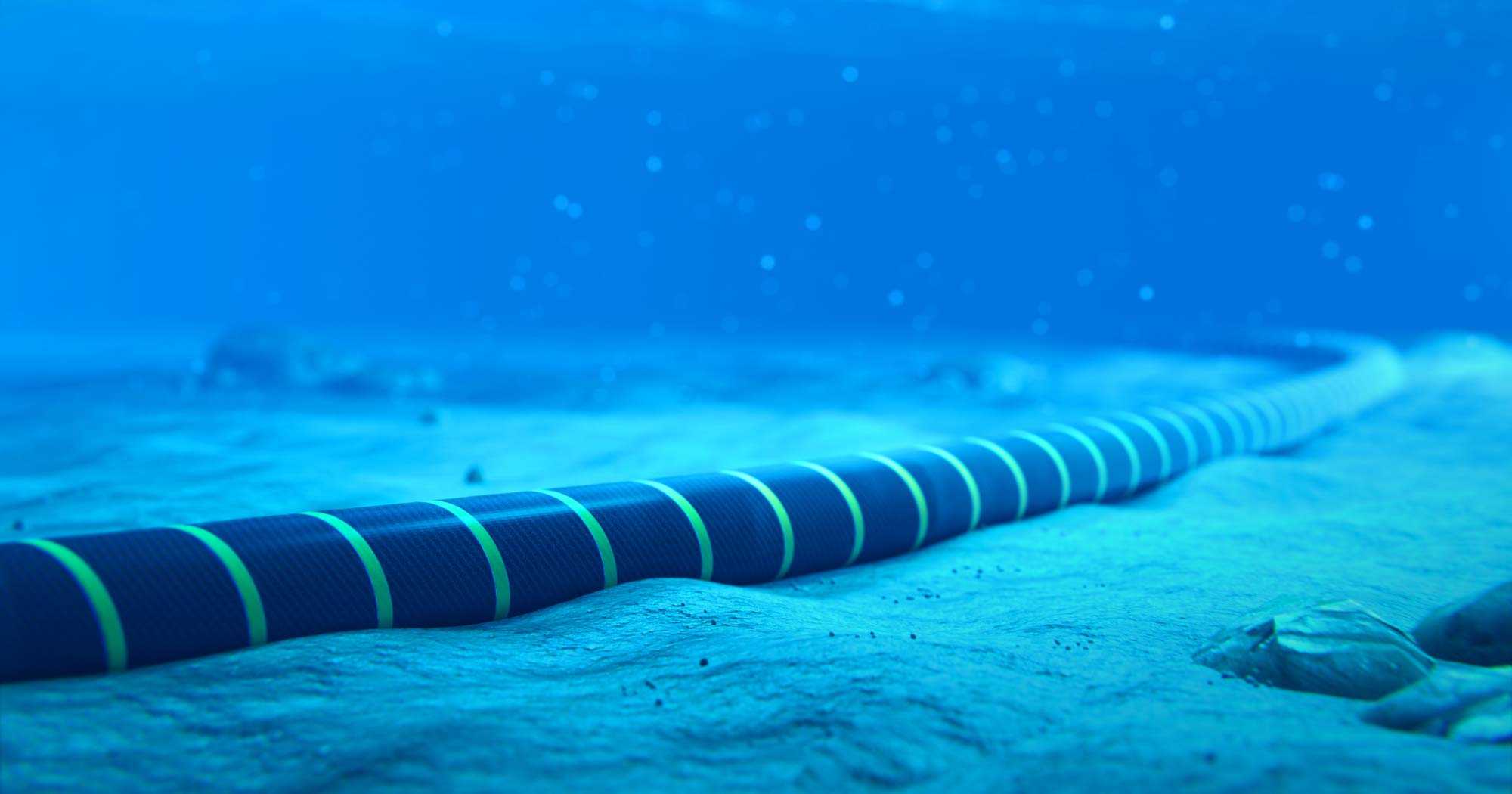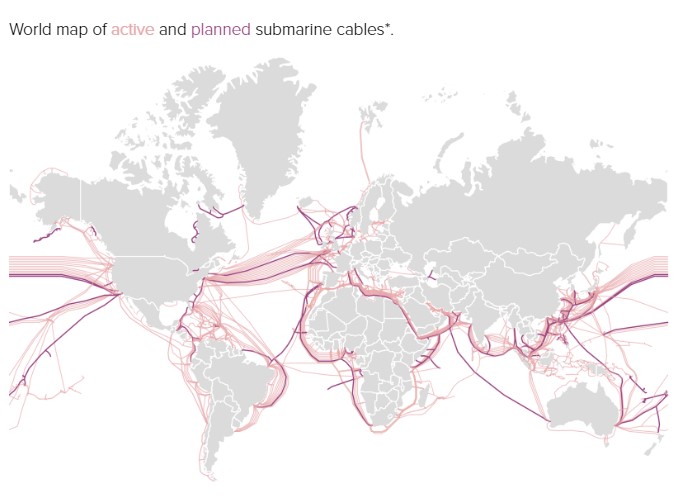What will France do to protect Internet cables from Russia

After the Nord Stream gas pipeline explosions, France took countermeasures to protect undersea Internet cables from sabotage. Italy and the UK also moved in the same direction. All the details and the companies involved
France is taking steps to strengthen the security of submarine cables, fearing attacks by Russia that would damage Internet connectivity on the European continent. Two anonymous sources told POLITICO that the French presidency has begun consultations on the matter with public officials, naval officers and experts of various kinds.
Fear of Russian sabotage
What motivates Paris is the concern that, after the explosions at the important Nord Stream 1 and 2 gas pipelines – which some European countries consider a probable act of Russian sabotage -, the Kremlin may decide to damage other strategic infrastructures: the submarine cables of the Internet. , which carry around 95 percent of global data traffic.
HOW MUCH WILL FRANCE SPEND FOR THE DEFENSE OF SUBMARINE CABLES
Two weeks ago, French President Emmanuel Macron declared that “we have essential infrastructures that are located outside our territory: cables, satellites, oil and gas pipelines. We have strengthened their security since the beginning of the war ”in Ukraine. According to the sources of POLITICO , the French presidency set up a “task force” on submarine cables immediately after the leaks of Russian gas from the Nord Stream pipelines.
The French 2023 budget also contains funds for the purchase of advanced defense technologies for critical infrastructures. 3.1 million euros were allocated for the protection of the "ocean floor" (ie natural ocean resources and cables) and for the "collection of sensitive objects".
As reported by Reuters , Paris has invested 11 million euros to purchase two unmanned underwater vehicles to be used for the protection of marine infrastructure: they will come into operation at the beginning of 2023. In early October, radio Europe 1 announced that Macron has ordered the inspection and "enhanced surveillance" of French Internet cables; the government will also invest in the purchase of a fleet of drones and robots that will be operational by 2025.
THE DECLARATIONS OF THE ELISEO
The French presidency denied the existence of a task force on submarine cables, and did not confirm the news from Reuters and Europe 1. In a statement, the Elysée specified that "the safety of cables is the responsibility of the operators, who have of advanced surveillance methods and can almost immediately redirect information in the event of an accident ”.
“It is not necessary to visually inspect the cables to verify their integrity”, it says, “because this is done by the operators, who also have the means to intervene and repair”.
COMPANIES THAT LAY CABLES IN FRANCE
There are two main cable-laying companies in France: Orange Marine, a subsidiary of the Orange telecommunications group (owned by the state with a stake of over 20 per cent), and Alcatel Submarine Networks, owned by the Finnish Nokia.
The US technology company Google, through its parent company Alphabet, is increasing its presence in the sector: in February 2021 it completed a transatlantic cable from the United States to France, called Dunant . Google has specified that its cables are "buried to avoid cyber attacks or other physical risks".

RISK OF AN INTERNET "BLACKOUT"
There are about thirty cables that land on the French coasts, making the country the main Internet entry point for continental Europe. The most strategic cables are about fifteen, which connect with the Atlantic Ocean and the Mediterranean Sea, up to the Red Sea and Asia.
According to experts, to cause a massive disruption of Internet services in Europe, Russia would have to sever at least ten cables. Cyrille Dalmont, a researcher at the think tank Institut Thomas More, explained to POLITICO that "most of the traffic [data, ed .] Crosses the Atlantic, so if one of these cables is interrupted, and not for scheduled maintenance, the disruptions [of the Internet, ed ] would be enormous, with critical infrastructures that will struggle to function ”.
To date, there are no confirmed incidents of government-sponsored cable attacks, but administrations in several Western countries have repeatedly said that Russia has the capabilities to tamper with them. There are very sophisticated sabotage methods, such as those involving the use of mini-submarines equipped with hydraulic clamps, but also very simple: the anchor of a fishing boat may be enough to damage a cable.
HOW TO DEFEND
Constant patrolling of the thousands of kilometers traveled by the cables connecting France would have an estimated cost of several million euros, but its effectiveness – especially in international waters – is doubtful.
According to Dalmont, "the only real defense" consists rather in the laying of more cables, which allows to increase the redundancy of the connections: in this way, "an act of sabotage will not trigger a blackout" of the Internet.
THE ANNOUNCEMENT OF THE EUROPEAN COMMISSION
The President of the European Commission, Ursula von der Leyen, announced in recent weeks a "stress test" of submarine cables aimed at "identifying weak points and preparing our response to a sudden interruption".
WHAT ITALY DOES BETWEEN SPARKLE AND NAVY
In July, Telecom Italia Sparkle, a subsidiary of TIM which manages an optical fiber network of approximately 600,000 kilometers, signed a cooperation agreement with the Italian Navy for the monitoring and protection of submarine telecommunication infrastructures.
On October 3, Reuters wrote that the Italian government has stepped up surveillance of submarine cables for telecommunications and energy.
THE UK MOVE
At the beginning of October, the UK announced the purchase, by 2022, of the first multi-role ocean surveillance vessel (MROSS) for the protection of cables and other strategic underwater infrastructures: it will go into operation in 2023. A second vessel will subsequently be built in country.
Details are scarce. Defense Secretary Ben Wallace said, however, that “our internet and our energy depend to a large extent on pipelines and cables. Russia does not hide its ability to target such infrastructures ”.
This is a machine translation from Italian language of a post published on Start Magazine at the URL https://www.startmag.it/innovazione/francia-cavi-sottomarini-difesa/ on Mon, 24 Oct 2022 08:43:43 +0000.
